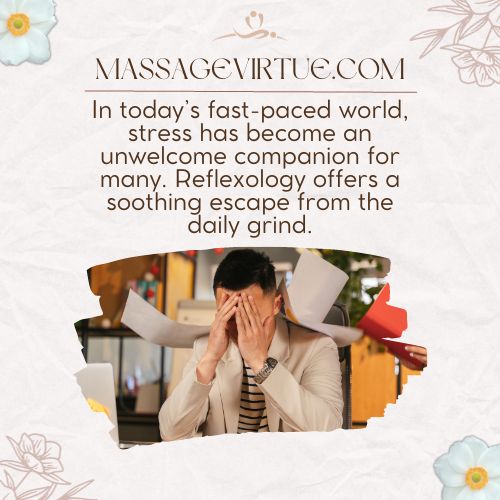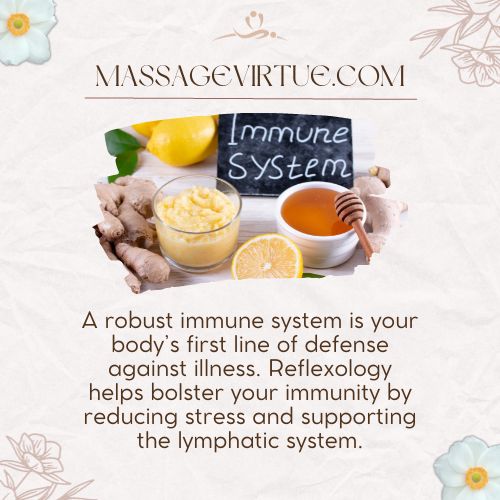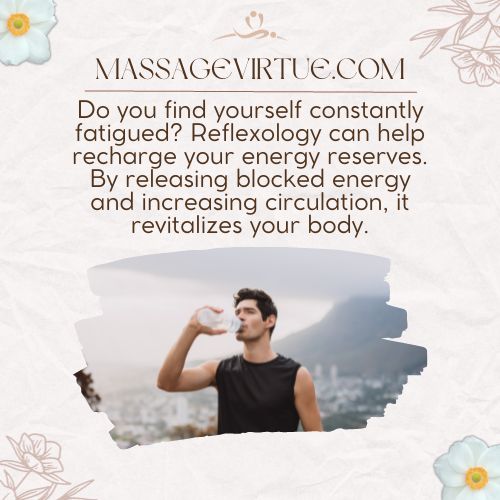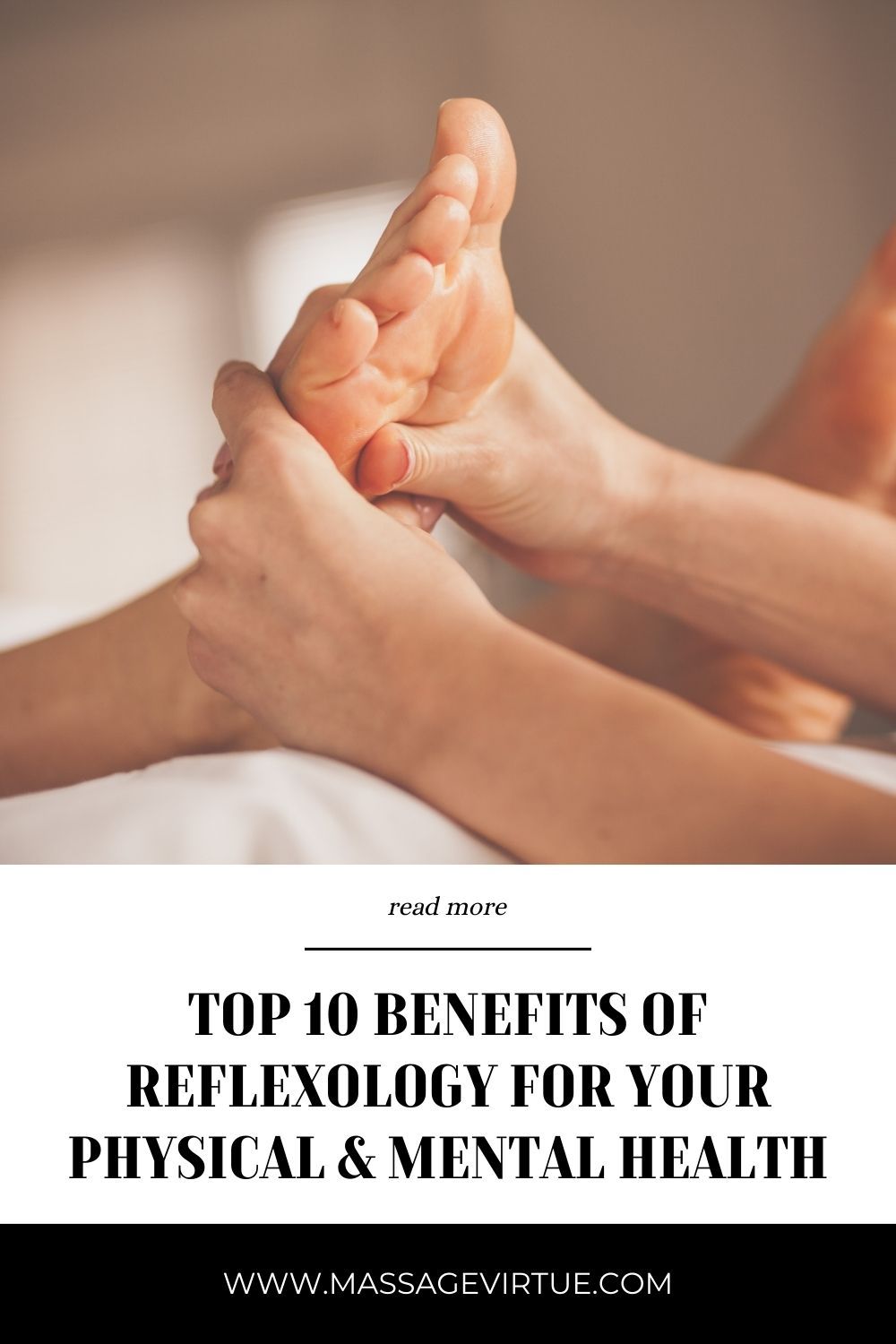Are you seeking a natural way to alleviate stress, improve circulation, and boost your overall well-being? Look no further than reflexology.
It is a holistic therapy that’s been used for centuries to promote healing and relaxation.
In this article, we’ll explore the 10 benefits of reflexology, shedding light on how it can enhance your life.
So without further ado, let’s get started.
10 Benefits of Reflexology
Reflexology is a holistic therapy that involves applying pressure to specific points on the feet or hands. It offers various benefits for your health. Let’s have a closer look at them:
1. Stress Relief
In today’s fast-paced world, stress has become an unwelcome companion for many.

Reflexology offers a soothing escape from the daily grind.
Applying gentle pressure to specific points on the feet helps to relax the nervous system, releasing built-up tension and promoting an overwhelming sense of calm.
2. Improved Circulation
Proper blood circulation is vital for overall health. Reflexology works wonders by enhancing blood flow throughout the body.
Through its therapeutic touch, it encourages the opening of blood vessels, allowing oxygen and nutrients to reach your organs and tissues more effectively.
3. Pain Relief
Chronic pain can be debilitating, but reflexology offers a drug-free alternative for relief.
By targeting reflex zones associated with pain, this therapy triggers the release of endorphins, your body’s natural painkillers.
Whether you’re dealing with back pain, migraines, or arthritis, reflexology can provide much-needed comfort.
4. Enhanced Nerve Function
The nervous system plays a pivotal role in our daily lives, controlling every movement and sensation. Reflexology stimulates nerve pathways, promoting better communication between your brain and body.
This can lead to improved coordination, increased sensory perception, and enhanced overall nerve function.
5. Boosted Immune System
A robust immune system is your body’s first line of defense against illness. Reflexology helps bolster your immunity by reducing stress and supporting the lymphatic system.

As your body relaxes and toxins are flushed away, your immune system becomes more efficient at fighting off infections.
6. Improved Digestion
Digestive issues can disrupt your life, but reflexology can help restore balance.
By targeting reflex zones related to digestion, it can alleviate symptoms such as bloating, constipation, and indigestion.
It encourages the smooth flow of digestive juices, leading to a healthier gut.
7. Better Sleep Quality
If you’ve ever struggled with insomnia or restless nights, reflexology might be your solution. By promoting relaxation and reducing stress, it sets the stage for a peaceful night’s sleep.
Regular sessions can lead to improved sleep patterns and increased sleep quality.
8. Stress-Related Headache Relief
Tension headaches often accompany stress and anxiety. Reflexology can provide swift relief by targeting pressure points associated with headache triggers.
It helps to ease muscle tension and improve blood flow, alleviating the pain that can be so debilitating.
9. Increased Energy Levels
Do you find yourself constantly fatigued? Reflexology can help recharge your energy reserves.

By releasing blocked energy and increasing circulation, it revitalizes your body, leaving you feeling more energized and ready to tackle your day.
10. Improved Focus
Maintaining focus in our distraction-filled world can be challenging. Reflexology can enhance mental clarity by reducing stress and improving overall well-being.
When your mind is at ease, concentration becomes more attainable.
5 Side Effects of Reflexology
Now, let’s take a closer look at the potential side effects of reflexology:
| Side Effect | Description |
| Temporary Discomfort | Some people may experience mild discomfort during a session, but it typically subsides quickly. |
| Increased Urination | Improved circulation may lead to increased urination after a session, which is normal. |
| Emotional Release | Reflexology can sometimes trigger emotional releases, as it helps release pent-up emotions stored in the body. |
| Tiredness | After a session, you may feel tired as your body undergoes a healing process. |
| Allergic Reactions | Although rare, some individuals may experience allergic reactions to oils or lotions used during a session. Always inform your therapist of any allergies beforehand. |
Conclusion
To wrap it up, reflexology is a holistic therapy with a wide range of benefits for those seeking natural ways to improve their health and well-being.
From stress relief to enhanced circulation and pain management, reflexology offers a gentle yet effective approach to holistic healing.
While it’s generally safe, it’s essential to consult with a qualified reflexologist and communicate any concerns or medical conditions before starting treatment.
FAQs
What Conditions Does Reflexology Treat?
Reflexology can help with various conditions, including stress, anxiety, pain, and digestive issues.
It’s also used for relaxation and overall well-being.
While it’s not a cure for specific diseases, it can complement other treatments and promote better health.
Do Foot Massages Release Toxins?
Foot massages don’t directly release toxins from your body. The idea of “toxin release” is a bit overhyped.
However, foot massages can improve circulation and relaxation, which can support your body’s natural detoxification processes over time.
What Are the Symptoms of a Reflexology Detox?
A reflexology detox might involve feeling tired or having increased urination. Some people may experience emotional releases, like feeling more emotional or tearful.
These symptoms are usually temporary and a sign that your body is responding to the treatment.
What Does It Mean If a Reflexology Point Hurts?
If a reflexology point hurts during a session, it could indicate an imbalance or tension in that area of your body.
Reflexologists believe that working on these points can help alleviate discomfort over time. However, it’s essential to communicate any pain or discomfort with your reflexologist during the session.
When Should You Not Do Reflexology?
You should avoid reflexology if you have certain conditions like deep vein thrombosis, open wounds, or cuts on your feet, or if you’re in the first trimester of pregnancy.


